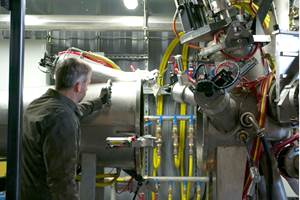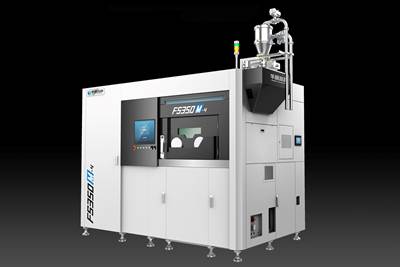Birmingham Researchers Develop Recyclable Photopolymer Resin Made From Biosourced Materials
A University of Birmingham-led team has produced a photopolymer resin that can be printed at high resolution, broken down to its constituent parts, recycled and reprinted.
Share
Read Next
A 3D printed complex part made from the entirely biosourced feedstock. Source: University of Birmingham
Researchers at the University of Birmingham have succeeded in producing a new type of recyclable photopolymer resin, made from biosourced materials. The new resin can be printed at high resolution and then be broken back down to its constituent parts, recycled and reprinted, with the addition of just a small amount of photoinitiator to maintain the material’s curable properties.
Photopolymer resins, which harden or cure on exposure to light, are commonly used in the manufacture of bespoke 3D printed parts. However, while technologies to improve the resolution of 3D printing and its speed of manufacture have advanced considerably, the resins themselves have changed very little since the process first emerged in the 1980s.
The basic materials — usually epoxies or acrylics — come mostly from petrochemical feedstocks. Although some progress has been made in the use of more sustainable resins derived from biomass, the recyclability of these is still limited, because they rely on irreversible bonds being created when the resin hardens. To break these bonds, additional chemicals have to be added at each stage, resulting in a “snowballing effect,” in which the only way to recycle the material is to make more of it.
Now, this new type of recyclable resin, made from biosourced materials, has been designed for use in 3D printing applications. In a study, published May 15, 2024, in Nature, researchers from the University of Birmingham showed that high-resolution, 3D printed structures can be manufactured from an entirely biosourced feedstock. Once these materials have reached the end of their useful life, the products can be recycled within an almost fully closed-loop system.
“Our approach is an important step away from relying on 3D-printable resins made from petrochemicals, which cannot be efficiently recycled,” says Andrew Dove, lead researcher and professor of sustainable polymer chemistry. “While we still have improvements to make to the properties of the new resin, this research opens up exciting new avenues for development.”
The feedstock for the process is made from lipoic acid, a naturally occurring fatty acid molecule which is commonly sold as a dietary supplement. The team made a combination of two monomers from the lipoic acid from which they were able to make a resin that could be recycled either back into the monomers or right back to the original molecule for recycling.
In the study, the researchers completed two ‘recycles,’ but anticipate that further recycles would be possible. Uses for the material could include industries where rapid prototyping is used to test products before moving to mass production. Although currently the material is more flexible than might be commonly used in industry, future applications could include automotive parts, medical and dental components, and even jewelry design.
“Enabling recycling within the light-mediated 3D printing industry is essential since it is a rapidly expanding method for materials production,” says Josh Worch, co-lead researcher and assistant professor. “We now have the prospect, with our technology, to help ensure that recycling becomes a built-in feature of 3D printing.”
The University of Birmingham Enterprise has filed a patent application covering the resin and its use in 3D printing.
Related Content
Continuum Powders Creates Energy Partnerships With Priority Power and AirGas
Continuum is contracting to secure some of the industry’s greenest sources for power and argon gas. When the entire combination of the new renewable energy sources are added with its proprietary process, the company anticipates a total energy consumption of nearly zero.
Read MoreAmerica Makes Names Winners of EARTH Project Totaling $1.2 Million
Recipients of America Makes’ EARTH project awards will explore sustainable approaches for reusing and recycling additive manufacturing materials and designs. Their initiatives are expected to make substantial contributions to reducing waste, conserving energy and mitigating carbon emissions
Read MoreSustainable Metal Powder Company Addresses Next Piece of Road Map: Renewable Energy
Continuum Powders, the material production arm of small-scale foundry technology company MolyWorks, has announced new partnerships aimed at further reducing the environmental impact of its metal powder production.
Read MoreMolyWorks Officially Rebrands as Continuum Powders and Appoints New CEO
As part of its rebranding, MolyWorks Materials Corp. has changed its name to Continuum Powders Corp. to become a single, unified brand that more accurately represents the future and differentiators of this sustainable metal powders company which focuses on innovation.
Read MoreRead Next
Bike Manufacturer Uses Additive Manufacturing to Create Lighter, More Complex, Customized Parts
Titanium bike frame manufacturer Hanglun Technology mixes precision casting with 3D printing to create bikes that offer increased speed and reduced turbulence during long-distance rides, offering a smoother, faster and more efficient cycling experience.
Read MoreProfilometry-Based Indentation Plastometry (PIP) as an Alternative to Standard Tensile Testing
UK-based Plastometrex offers a benchtop testing device utilizing PIP to quickly and easily analyze the yield strength, tensile strength and uniform elongation of samples and even printed parts. The solution is particularly useful for additive manufacturing.
Read MorePostprocessing Steps and Costs for Metal 3D Printing
When your metal part is done 3D printing, you just pull it out of the machine and start using it, right? Not exactly.
Read More



















